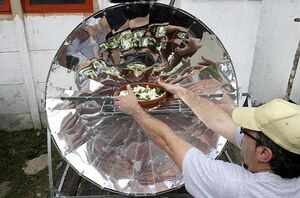m (→Audio and video: Cat change) |
Tom Sponheim (talk | contribs) m (→Events) |
||
| Line 1: | Line 1: | ||
{{GoogleTranslateLinks}} |
{{GoogleTranslateLinks}} |
||
==Events== |
==Events== |
||
| + | *'''April 19 - 29, 2012: (Havana)''' Eco Cuba Exchange and [[Solar Energy International]] are offering you an opportunity to study renewable energy/energy efficiency policy and programs in Cuba. This year you may choose to participate in the entire program involving policy meetings and installation site visits in Havana City, Pinar del Rio and Santiago de Cuba, as well as the Tenth International CUBA SOLAR Conference in Santiago de Cuba. Or you may choose to participate only in the research tour of Havana and Pinar del Rio. [http://www.globalexchange.org/tours/cuba-renewable-energy-energy-efficiency-cubacuba-solar-conference More Information...] |
||
| + | |||
See [[Calendar of events]] |
See [[Calendar of events]] |
||
| + | |||
==News and Recent Developments== |
==News and Recent Developments== |
||
[[File:El_Romero_restaurant,_Cuba.jpg_.jpg|thumb|300px|Chef Inti Langaney cooks vegetables with a [[parabolic solar cooker]] at the El Romero eco-restaurant in Pinar del Rio, [[Cuba]].]] |
[[File:El_Romero_restaurant,_Cuba.jpg_.jpg|thumb|300px|Chef Inti Langaney cooks vegetables with a [[parabolic solar cooker]] at the El Romero eco-restaurant in Pinar del Rio, [[Cuba]].]] |
||
Revision as of 19:01, 11 March 2012
Events
- April 19 - 29, 2012: (Havana) Eco Cuba Exchange and Solar Energy International are offering you an opportunity to study renewable energy/energy efficiency policy and programs in Cuba. This year you may choose to participate in the entire program involving policy meetings and installation site visits in Havana City, Pinar del Rio and Santiago de Cuba, as well as the Tenth International CUBA SOLAR Conference in Santiago de Cuba. Or you may choose to participate only in the research tour of Havana and Pinar del Rio. More Information...
News and Recent Developments

Chef Inti Langaney cooks vegetables with a parabolic solar cooker at the El Romero eco-restaurant in Pinar del Rio, Cuba.
- February 2011: The eco-friendly vegetarian restaurant, El Romero, in Pinar del Rio, has begun to offer dishes prepared with solar cookers.
The History of Solar Cooking in Cuba
When planning was underway for the Second World Conference on Solar Cooking, to be held in Costa Rica, in July of 1994, an abstract for a presentation to be made was received from a Cuban staff member of the Solar Energy Research Center in that nation. The letter told of their work, particularly with solar drying of food and even construction materials, as well as the use of solar energy for purifying and distilling water. What happened is unclear, as the paper does not appear in the program. However, it is evident that some action regarding the use of solar energy for household was taking place at that time.
Two years later, in 1996, an SCI volunteer and trainer of many, Don Coan of Sacramento, California, attended a conference on sustainable energy use in Cuba. He recounted some of the uses of solar energy he was shown during his visit. Sun Oven box cookers, gifts from a visitor, were in use at an Eco-restaurant at the National Botanical Garden. One secondary school had a large parabolic solar reflector that directed sunrays to pots inside the building - it was however not in use at the time of Coan's visit.
Considerable use of photo-voltaics was evident, and small streams were used to generate hydroelectric power. Waste from the production of sugar is burned as a major source of energy, producing a good bit of pollution, and use of renewable energy would obviously be useful. However, the embargo on goods has made any and all importation difficult and costly.
The Renewable Energy Group at Eastern University, Santiago de Cuba, indicated in 1998 that they had been working on solar cookers for over ten years and had at that time disseminated 200 cookers to families and 50 to schools of the area. It is evident that substantial interest and experimentation has been present in Cuba. Cuba has excellent sunshine and few other fuel resources; hence it could almost certainly utilize solar cooking. Cuba may well be doing more than is known without communicating that information to the international community.
[Information for this section was taken originally from State of the Art of Solar Cooking by Dr. Barbara Knudson]
Climate, Culture, and Special Considerations
Resources
Reports
Articles in the media
Web pages
Audio and video
Contacts
The entities listed below are either based in Cuba, or have established solar cooking projects there:
SCI Associates
- Main article: Solar Cookers International Association
